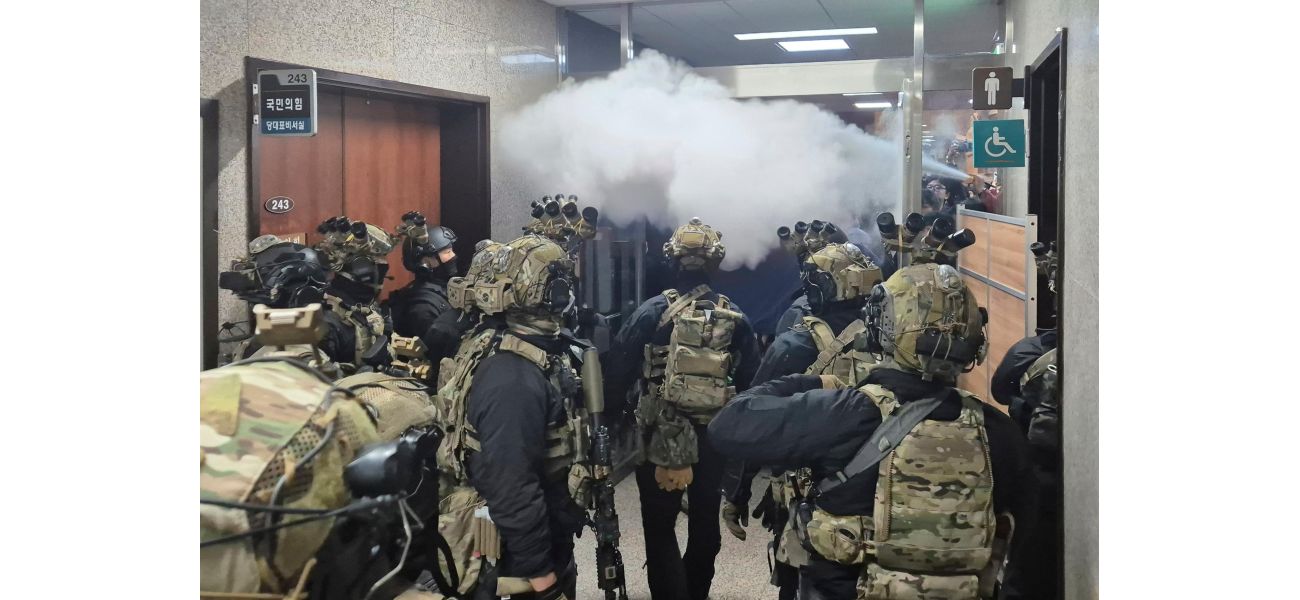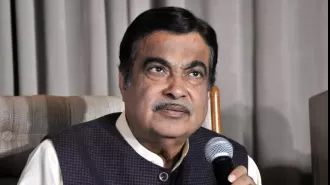Opposition in South Korea moves to impeach President Yoon due to abrupt martial law.
South Korean opposition party calls for President Yoon Suk Yeol's resignation or impeachment after he lifted short-lived martial law following parliamentary vote.
December 4th 2024.

On a cold December morning in Seoul, South Korea, chaos ensued as President Yoon Suk Yeol faced mounting pressure to resign from his position. It all began when he declared a short-lived martial law, which led to troops surrounding Parliament as lawmakers voted to overturn it. This decision was met with swift backlash, with the opposition parties submitting a motion to impeach President Yoon. In order for this to happen, two-thirds of Parliament must support the motion and at least six Constitutional Court justices must back it. The motion was jointly submitted by the main opposition Democratic Party and five smaller opposition parties, with a potential vote as early as Friday.
In the midst of this political turmoil, Yoon's senior advisers and secretaries collectively offered to resign, while his Cabinet members, including Defense Minister Kim Yong Hyun, faced calls to step down. Many were left questioning the seemingly poorly thought-out actions of the President. Despite the chaos, life in the capital city continued as normal, with tourists and residents going about their day and the sounds of traffic and construction filling the air.
The events leading up to this moment began the previous night when Yoon suddenly imposed emergency martial law, citing the need to eliminate "anti-state" forces. This was seen as a desperate move to push his agenda forward in a Parliament dominated by the opposition. However, after just six hours, the National Assembly voted to overturn the declaration and it was formally lifted in a Cabinet meeting at 4:30 a.m.
The Democratic Party, with a majority in Parliament, wasted no time in calling for Yoon to resign immediately or face impeachment. They declared his martial law declaration as a clear violation of the constitution and a grave act of rebellion. In order for Yoon to be impeached, 200 of the 300 members of Parliament must support the motion. The Democratic Party, along with other small opposition parties, held 192 seats, but during the vote to overturn the martial law, 18 lawmakers from Yoon's ruling People Power Party cast ballots in favor of the rejection. Even the leader of the People Power Party, who has a close relationship with Yoon, criticized the decision as unconstitutional.
If Yoon is impeached, he will be stripped of his powers until the Constitutional Court can rule on his fate. In the meantime, Prime Minister Han Duck-soo would take over his presidential responsibilities. As calls for Yoon's Cabinet to resign grew, Han pleaded for patience and urged Cabinet members to continue fulfilling their duties.
The process of impeaching a president requires at least six of the Constitutional Court's nine justices to support the motion. However, due to recent retirements, the court currently only has six justices, making it necessary for new justices to be named in order to handle this case. Yoon's martial law declaration was the first of its kind in over 40 years, harkening back to a time when military-backed governments occasionally proclaimed martial law to prevent anti-government demonstrations. Scenes of troops and armored vehicles on the streets were reminiscent of this dark period in South Korea's history.
Throughout the night, troops were seen carrying full battle gear, including assault rifles, as they tried to keep protesters away from Parliament. Military helicopters flew overhead and landed nearby, while one soldier even pointed his rifle at a woman among the protesters. However, it remains unclear how the 190 lawmakers were able to enter the parliamentary hall to vote against the martial law decree. Opposition leader Lee Jae-myung even livestreamed himself climbing over a wall, while troops and police officers did not use force to stop others from entering.
Despite the tense atmosphere, no major violence was reported and the troops and police eventually left the National Assembly grounds after the vote to overturn the martial law. National Assembly Speaker Woo Won Shik commended the maturity of the military in handling the situation, despite the unfortunate memories of past military coups. As the dust settles, the nation waits for Yoon to explain his decision and for the Defense Ministry to comment on the events.
South Korea was in a state of chaos as opposition parties called for the impeachment of President Yoon Suk Yeol. The pressure for him to step down intensified after he declared a short-lived martial law that sparked troops to surround parliament. The unexpected move was met with swift backlash and ultimately ended when lawmakers voted to overturn it. As a result, Yoon's senior advisors and secretaries offered to resign and there were calls for his Cabinet members, including Defense Minister Kim Yong Hyun, to do the same.
In the bustling capital city of Seoul, life seemed to carry on as usual on that sunny, cold December morning. Tourists and residents went about their day, the sounds of traffic and construction filling the air. The only sign that something was amiss were the crowds of police holding shields. It was a stark contrast to the scenes just hours before, as Yoon's martial law declaration had caused a stir and brought the military into the picture.
The events leading up to the call for Yoon's resignation began on Tuesday night when he suddenly announced a state of emergency. He claimed that it was necessary to eliminate "anti-state" forces, as he faced difficulty in pushing forward his agenda in the opposition-dominated parliament. However, this declaration was short-lived, lasting only about six hours before it was overruled by the National Assembly. The emergency was officially lifted during a Cabinet meeting at 4:30 a.m.
The liberal opposition Democratic Party, which holds a majority in the parliament, wasted no time in calling for Yoon to step down immediately. They also threatened to impeach him if he did not comply. In a statement, they condemned his actions as a clear violation of the constitution and a grave act of rebellion. They believed that this was sufficient grounds for his impeachment, which would require the support of two-thirds of the parliament.
Despite the Democratic Party and other smaller opposition parties holding a combined total of 192 seats, they were confident in their ability to impeach Yoon. This was due to the fact that when the parliament voted to reject his martial law declaration, 18 lawmakers from Yoon's own ruling party voted against him. Even the leader of the ruling party, Han Dong-hun, criticized Yoon's actions as unconstitutional. If Yoon were to be impeached, he would be stripped of his presidential powers until the Constitutional Court could make a ruling on his fate. In the meantime, the No. 2 position in the South Korean government, Prime Minister Han Duck-soo, would take over his responsibilities.
As calls for Yoon's Cabinet members to resign grew louder, Prime Minister Han appealed for patience and urged them to continue fulfilling their duties. However, there were concerns about whether the Constitutional Court would be able to handle a presidential impeachment case, as it currently only has six out of the required nine justices. This was due to the recent retirements of three justices, which meant that new justices would need to be appointed quickly in order to proceed with the impeachment process.
For many, Yoon's martial law declaration brought back memories of South Korea's past military-backed governments. It was a shock to see troops and tanks on the streets, something that hadn't been seen since the country achieved democracy in the 1980s. Despite this, there was no major violence reported, and the troops and police were seen leaving the National Assembly grounds after the vote to lift the martial law. National Assembly Speaker Woo Won Shik praised the maturity of the military in handling the situation. However, there were still questions surrounding Yoon's decision and the role of Defense Minister Kim Yong Hyun, who had recommended the martial law declaration. As of now, the Defense Ministry has not released any statements regarding the events.
In the midst of this political turmoil, Yoon's senior advisers and secretaries collectively offered to resign, while his Cabinet members, including Defense Minister Kim Yong Hyun, faced calls to step down. Many were left questioning the seemingly poorly thought-out actions of the President. Despite the chaos, life in the capital city continued as normal, with tourists and residents going about their day and the sounds of traffic and construction filling the air.
The events leading up to this moment began the previous night when Yoon suddenly imposed emergency martial law, citing the need to eliminate "anti-state" forces. This was seen as a desperate move to push his agenda forward in a Parliament dominated by the opposition. However, after just six hours, the National Assembly voted to overturn the declaration and it was formally lifted in a Cabinet meeting at 4:30 a.m.
The Democratic Party, with a majority in Parliament, wasted no time in calling for Yoon to resign immediately or face impeachment. They declared his martial law declaration as a clear violation of the constitution and a grave act of rebellion. In order for Yoon to be impeached, 200 of the 300 members of Parliament must support the motion. The Democratic Party, along with other small opposition parties, held 192 seats, but during the vote to overturn the martial law, 18 lawmakers from Yoon's ruling People Power Party cast ballots in favor of the rejection. Even the leader of the People Power Party, who has a close relationship with Yoon, criticized the decision as unconstitutional.
If Yoon is impeached, he will be stripped of his powers until the Constitutional Court can rule on his fate. In the meantime, Prime Minister Han Duck-soo would take over his presidential responsibilities. As calls for Yoon's Cabinet to resign grew, Han pleaded for patience and urged Cabinet members to continue fulfilling their duties.
The process of impeaching a president requires at least six of the Constitutional Court's nine justices to support the motion. However, due to recent retirements, the court currently only has six justices, making it necessary for new justices to be named in order to handle this case. Yoon's martial law declaration was the first of its kind in over 40 years, harkening back to a time when military-backed governments occasionally proclaimed martial law to prevent anti-government demonstrations. Scenes of troops and armored vehicles on the streets were reminiscent of this dark period in South Korea's history.
Throughout the night, troops were seen carrying full battle gear, including assault rifles, as they tried to keep protesters away from Parliament. Military helicopters flew overhead and landed nearby, while one soldier even pointed his rifle at a woman among the protesters. However, it remains unclear how the 190 lawmakers were able to enter the parliamentary hall to vote against the martial law decree. Opposition leader Lee Jae-myung even livestreamed himself climbing over a wall, while troops and police officers did not use force to stop others from entering.
Despite the tense atmosphere, no major violence was reported and the troops and police eventually left the National Assembly grounds after the vote to overturn the martial law. National Assembly Speaker Woo Won Shik commended the maturity of the military in handling the situation, despite the unfortunate memories of past military coups. As the dust settles, the nation waits for Yoon to explain his decision and for the Defense Ministry to comment on the events.
South Korea was in a state of chaos as opposition parties called for the impeachment of President Yoon Suk Yeol. The pressure for him to step down intensified after he declared a short-lived martial law that sparked troops to surround parliament. The unexpected move was met with swift backlash and ultimately ended when lawmakers voted to overturn it. As a result, Yoon's senior advisors and secretaries offered to resign and there were calls for his Cabinet members, including Defense Minister Kim Yong Hyun, to do the same.
In the bustling capital city of Seoul, life seemed to carry on as usual on that sunny, cold December morning. Tourists and residents went about their day, the sounds of traffic and construction filling the air. The only sign that something was amiss were the crowds of police holding shields. It was a stark contrast to the scenes just hours before, as Yoon's martial law declaration had caused a stir and brought the military into the picture.
The events leading up to the call for Yoon's resignation began on Tuesday night when he suddenly announced a state of emergency. He claimed that it was necessary to eliminate "anti-state" forces, as he faced difficulty in pushing forward his agenda in the opposition-dominated parliament. However, this declaration was short-lived, lasting only about six hours before it was overruled by the National Assembly. The emergency was officially lifted during a Cabinet meeting at 4:30 a.m.
The liberal opposition Democratic Party, which holds a majority in the parliament, wasted no time in calling for Yoon to step down immediately. They also threatened to impeach him if he did not comply. In a statement, they condemned his actions as a clear violation of the constitution and a grave act of rebellion. They believed that this was sufficient grounds for his impeachment, which would require the support of two-thirds of the parliament.
Despite the Democratic Party and other smaller opposition parties holding a combined total of 192 seats, they were confident in their ability to impeach Yoon. This was due to the fact that when the parliament voted to reject his martial law declaration, 18 lawmakers from Yoon's own ruling party voted against him. Even the leader of the ruling party, Han Dong-hun, criticized Yoon's actions as unconstitutional. If Yoon were to be impeached, he would be stripped of his presidential powers until the Constitutional Court could make a ruling on his fate. In the meantime, the No. 2 position in the South Korean government, Prime Minister Han Duck-soo, would take over his responsibilities.
As calls for Yoon's Cabinet members to resign grew louder, Prime Minister Han appealed for patience and urged them to continue fulfilling their duties. However, there were concerns about whether the Constitutional Court would be able to handle a presidential impeachment case, as it currently only has six out of the required nine justices. This was due to the recent retirements of three justices, which meant that new justices would need to be appointed quickly in order to proceed with the impeachment process.
For many, Yoon's martial law declaration brought back memories of South Korea's past military-backed governments. It was a shock to see troops and tanks on the streets, something that hadn't been seen since the country achieved democracy in the 1980s. Despite this, there was no major violence reported, and the troops and police were seen leaving the National Assembly grounds after the vote to lift the martial law. National Assembly Speaker Woo Won Shik praised the maturity of the military in handling the situation. However, there were still questions surrounding Yoon's decision and the role of Defense Minister Kim Yong Hyun, who had recommended the martial law declaration. As of now, the Defense Ministry has not released any statements regarding the events.
[This article has been trending online recently and has been generated with AI. Your feed is customized.]
[Generative AI is experimental.]
0
0
Submit Comment





